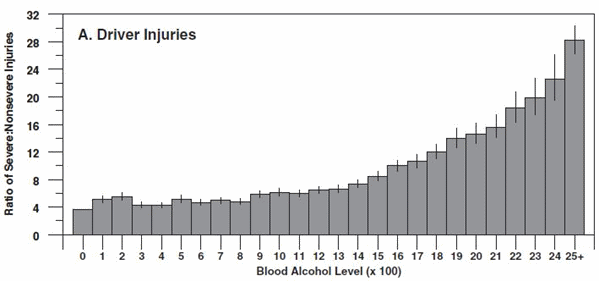A. About the same.
A. About the same.
B. Less serious.
C. More serious.
While you are far more likely to have a serious accident if you have been drinking, a higher level of blood alcohol tends to result in less severe injuries. This study of over 2300 accident victims showed no correlation between blood alcohol level and length of hospital stay after an accident, all other things being equal.
Your likelihood of having an accident increases because your control over your vehicle decreases the more you drink, and the more drunk you are the more likely you are to engage in riskier driving such as speeding. However, perhaps the slightly more relaxed state of the body results in less injuries if you remove all other factors.
Another study found that even with a blood alcohol level as low as 0.01 you are significantly more likely to be involved in an accident.
One study found that the relative seriousness of accidents drops when BAC rises to 0.03%, stays stable through 0.04%, then rises again at 0.05% to the same level as 0.02%.

The basic conclusion is that an increase from 0.00-0.02% in a driver's blood alcohol significantly increases the risk that the driver will be injured in an accident.
A New Zealand study found that there is an 18% greater risk of being killed in a car accident when you are driving at the limit (0.05%) if you are aged 20-29 but a 30% increase in risk if you are 15-19.